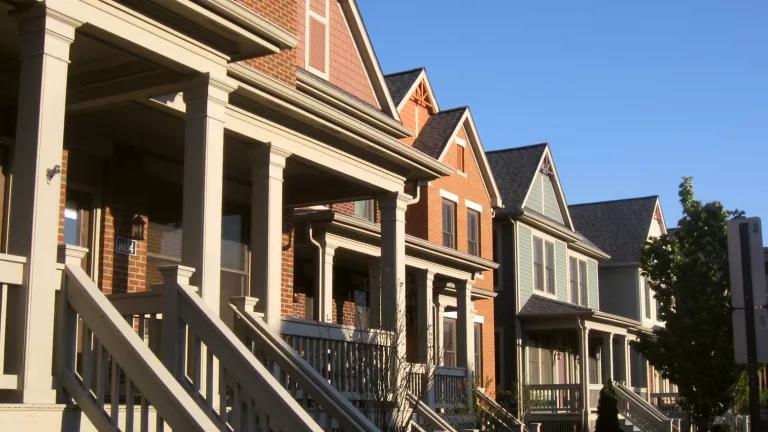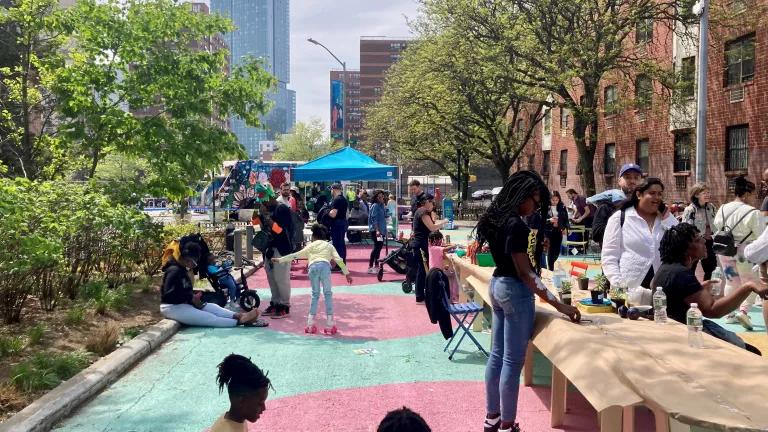Columbus Strides Forward on Its Sustainable Steps Program
There’s no slowing down Columbus, Ohio, as it continues to stride forward on climate action. On Energy Efficiency Day, October 7, the city celebrated a major achievement: the completion of more than 30,000 home energy audits within just two years.

Progressing neighborhood by neighborhood, home energy audits were conducted to evaluate residents’ energy usage and identify areas for better efficiency. Residents were then connected to rebates and resources to help them reduce their energy waste.
This blog was co-authored with Jenna Tipaldi, Climate Advisor to the City of Columbus.
There’s no slowing down Columbus, Ohio, as it continues to stride forward on climate action. On Energy Efficiency Day, October 7, the city celebrated a major achievement: the completion of more than 30,000 home energy audits within just two years.
Energy audits are critical to helping homes maximize energy efficiency while reducing both carbon emissions and utility bills. Home energy audits were the key first project of the city’s Sustainable Steps program, a part of the larger Sustainable Columbus initiative and Community Energy Savers program. Launched in spring 2019, Sustainable Steps aims to provide residents, businesses, and community members with simple and actionable steps to improve their lives while advancing sustainability measures.
Progressing neighborhood by neighborhood, home energy audits were conducted to evaluate residents’ energy usage and identify areas for better efficiency. Residents were then connected to rebates and resources to help them reduce their energy waste.
Derek Anderson, Assistant Director in Columbus’ Department of Public Utilities and the Community Energy Savers lead, says the priority was to first “focus on neighborhoods with the highest energy burden, where residents are paying, in some cases, more than 10 percent of their income on utility bills.” As Mayor Andrew J. Ginther explains, “The City of Columbus is committed to creating an equitable, sustainable, and resilient future for our community.”
Improving energy efficiency with simple, affordable fixes—weather stripping to reduce drafts, low-flow showerheads, LED light bulbs, etc.—not only reduces a family’s heating and cooling bills each month but also cuts a home’s overall greenhouse gas emissions output.
As an additional incentive, if communities met home energy audit goals, the Sustainable Steps program rewarded them with grants of up to $35,000 for further energy improvements. The Linden neighborhood, for example, applied its grant toward the installation of more efficient water heaters at local schools and improved, efficient lighting at one of their playgrounds. Additionally, in the Franklinton neighborhood, the grant was used to upgrade lighting at their local library and community house, all of which help to expand overall sustainability throughout the city.
The home energy audit goal was an ambitious one. But with support from Bloomberg Philanthropies American Cities Climate Challenge and Energy Foundation, Columbus was able to partner with IMPACT Community Action to bring on “community energy advocates” to help conduct the audits. Mayor Ginther also credits the collaborative efforts of residents, neighborhood organizations, AEP Ohio, Columbia Gas of Ohio, the Mid-Ohio Regional Planning Commission, and other community stakeholders for meeting that goal. As council member and environmental chair Emmanuel Remy says, “We all have the ability to become climate change-makers.”
Even more impressively, the city continued audits during the height of the pandemic - ensuring resident safety by socially distancing and other best practices. “Now, 2020 came with a curveball—COVID-19—but it didn’t stop Columbus,” notes Anderson. “We launched Community Energy Savers in three more communities” and, despite significant challenges, all were completed by the first week of October. Columbus also passed a benchmarking and transparency ordinance in March to track the carbon emissions of both commercial and large multi-family buildings.
In celebration of these successes, Mayor Ginther signed a proclamation declaring that week as Columbus’ new Energy Efficiency Week. Mayor Ginther also announced the city’s next goal would be for all Columbus residents to use 10 percent less energy by 2030, in order to keep pace with the overall target of carbon neutrality by 2050. And there was a recent win at the ballot box, too—Issue 1, which passed with overwhelming voter support, allows Columbus residents and small businesses to pool together and buy electricity from clean, renewable energy sources at bulk-purchase rates. If the accomplishments so far in its Sustainable Steps program are any indication, Columbus is well on its way to achieving its climate action goals.



